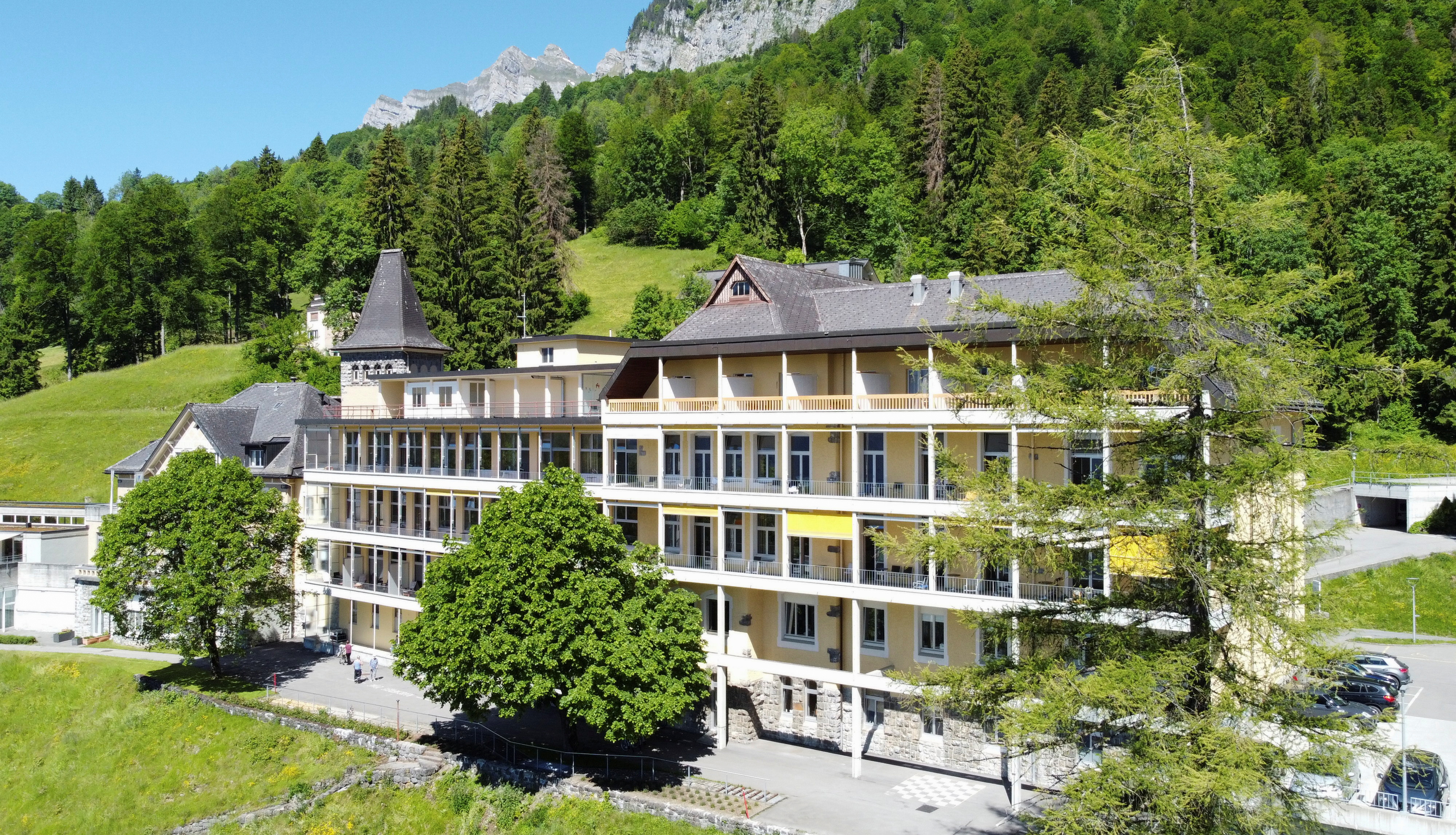By John Miller
WALD/DAVOS, Switzerland (Reuters) -Swiss mountain sanatoriums whose fresh-air and sunlight cures once drew tuberculosis patients from across Europe are reinventing themselves for a new generation: Patients suffering from the lingering effects of COVID-19.
Early in the pandemic, Klinik Wald, built in Zurich's highlands in 1898 for low income victims of the lung disease, took on many patients straight from intensive care.
Now, more so-called "long COVID" victims are coming for rehabilitation and fill 5-10% of its 158 beds, Dr. Marc Spielmanns, its medical director, said.
It is part of a long evolution for 19th- and early 20th-century Swiss sanatoriums, a dozen of which became modern rehab hospitals in their ongoing fight to stay relevant.
Spielmanns said proper rehabilitation can succeed anywhere, but that Klinik Wald's remote setting overlooking Lake Zurich and the Alps, may offer extra respite. Patients recuperate from COVID-19 on sun-soaked balconies where tuberculosis (TB) patients rested decades ago.
"They are really fatigued," Spielmanns said. "This environment... helps them to get on the way back to normality."
Long COVID includes not just respiratory difficulties and fatigue, but also anxiety and depression. The World Health Organization fears it may burden health systems for years to come.
The United States and Britain rely largely on out-patient therapy for their long COVID rehab.
While Switzerland and neighbouring Germany offer similar outpatient programmes, they also send some long COVID patients for weeks-long residential therapy, sometimes in cure centres like Wald founded more than a century ago.
A four- to six-week stay at Klinik Wald costs about 17,000-25,000 Swiss francs ($27,833). Switzerland's private health insurance system in most instances covers the bill, the Federal Health Ministry said, adding "services must be effective, appropriate and economical".
'COME BACK TO YOURSELF'
In April, a Swiss Army officer checked into the 120-year-old Hochgebirgsklinik, a former TB sanatorium in the Swiss mountain town of Davos. The "cognitive fog" that accompanied long COVID left him unable to work, he said.
"COVID took a little part of my lungs, and a big part of my brain," said the 56-year-old officer, who asked that his name not be used.
After six weeks of treatment, for his lungs and his psyche, he is preparing to return home. "You need this time to be out of the system...to come back to yourself," the officer said.
Since the SARS-CoV-2 virus attacks multiple organs, Prof. Dr. Hans-Werner Duchna, the Hochgebirgsklinik's chief pulmonologist, said cardiologists, occupational therapists and psychologists work together with one simple aim.
"We try to bring the patient back to his or her daily life."
HOW OTHERS DO IT
In the Italian Alps, a giant 3,000-bed TB sanatorium-turned-hospital in Sondalo, built in 1932 by dictator Benito Mussolini to rival Davos's sanatorium industry, has provided long COVID care for 100 patients, doctors there said.
In Germany, COVID "Long Haulers" may go to rehab retreats like the Median Klinik in Heiligendamm, a 230-year-old Baltic Sea spa once popular with European nobility. Stays run 3-5 weeks, a spokeswoman said, with insurance usually picking up the tab.
Britain, meanwhile, set aside 34 million pounds ($48 million) to start 83 long COVID clinics for "community-based therapy services", delivering help for fatigue or respiratory complaints.
Dr. Melissa Heightman, an NHS England Long Covid Task Force member, said residential therapy "would not be an affordable model", with hundreds of thousands of U.K. long COVID sufferers potentially needing help.
Similarly, Dr. Alberto Esquenazi, board member of the American Medical Rehabilitation Providers Association (AMRPA), with 650 member facilities, said U.S. long COVID rehab patients can expect outpatient therapy.
Results have been encouraging, so far, he said.
"With this intervention, working on strength, endurance, balance and concentration, they tend to do well," Esquenazi, chief medical officer at Philadelphia-based rehab facility MossRehab, said.
REINVENTING REHAB
Mile-high Davos once boasted 40 tuberculosis sanatoriums for wealthy Europeans whose long stays were romanticized in German author Thomas Mann's novel "The Magic Mountain".
But when antibiotics tamed TB in the 1950s, some Swiss sanatoriums like the famed Schatzalp became hotels. Many others failed. The handful that have survived developed new rehab programmes for cancer, asthma or chronic disease, said Flurin Condrau, a University of Zurich expert on historic sanatoriums.
Still, it hasn't been easy: Klinik Wald was nearly abandoned in 2012, while German shipping billionaire Klaus-Michael Kuehne saved Davos's Hochgebirgsklinik from insolvency two years later.
"All of them say, 'If we don't compete for patients and others do, we lose,'" Condrau said, of clinics' efforts to re-invent themselves. "That is responsible for them being quick out of the gate in identifying long COVID as an opportunity."
For instance, 112-year-old Rehazentrum Walenstadtberg, atop a winding, one-lane road beneath Switzerland's jagged Churfirsten mountains, admitted its first non-TB patient in 1965 before adding a multiple sclerosis wing in 1978.
It kept its lung programmes, which chief doctor Bjoern Janssen said proved a lifesaver this year: Walenstadtberg has treated 500 acute and post-intensive care COVID-19 patients, while referring long COVID cases to a sister clinic nearby.
"That has a connection to our roots as a tuberculosis clinic," Janssen said. "This tradition has always continued."

($1 = 0.7090 pounds)
($1 = 0.8979 Swiss francs)